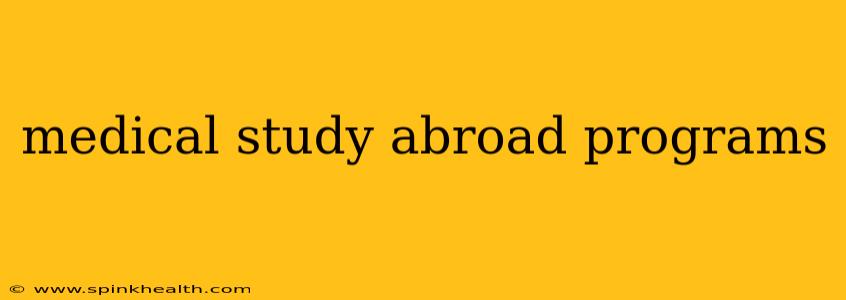Embark on a Global Journey: Exploring Medical Study Abroad Programs
The world is your classroom. For aspiring medical professionals, the opportunity to study medicine abroad isn't just an adventure; it's a transformative experience that broadens horizons, sharpens skills, and deepens understanding. But with so many options available, navigating the landscape of medical study abroad programs can feel overwhelming. This guide will illuminate the path, exploring the benefits, challenges, and essential considerations for embarking on this enriching journey.
Imagine yourself immersed in a vibrant foreign culture, collaborating with international peers, and gaining firsthand experience in diverse healthcare systems. This isn't a fantasy; it's a reality within reach for ambitious medical students. Let's delve deeper into the intricacies of medical study abroad programs.
What are the benefits of studying medicine abroad?
Studying medicine abroad offers a wealth of advantages that extend far beyond academic learning. The benefits include:
-
Exposure to Diverse Healthcare Systems: Witnessing firsthand how healthcare is delivered in different countries provides invaluable perspective and enhances adaptability, critical skills for any future physician. You’ll learn about different approaches to diagnosis, treatment, and patient care, broadening your understanding of global health challenges.
-
Enhanced Clinical Skills: Many programs provide hands-on clinical experience in international settings, allowing you to refine your skills under the guidance of experienced professionals. This practical application of theoretical knowledge is invaluable for professional development.
-
Cultural Immersion and Personal Growth: Living and studying in a new country fosters personal growth, adaptability, and cultural sensitivity – all essential traits for successful medical professionals who will inevitably work with patients from diverse backgrounds.
-
Improved Language Skills: Immersion in a foreign language environment naturally improves your fluency and communication skills, crucial for effective patient interaction in a globalized world.
-
Networking Opportunities: You'll build connections with students and professionals from around the world, establishing a global network that can benefit your career trajectory.
What types of medical study abroad programs are available?
The options for medical study abroad programs are varied and cater to different needs and goals. Some common program types include:
-
Short-Term Programs: These typically last a few weeks or months, offering a taste of international medical experiences. They are perfect for students who want a shorter, more focused experience.
-
Semester or Year-Long Programs: Longer programs provide a more immersive experience, allowing for deeper engagement with the local culture and healthcare system.
-
Research-Based Programs: These programs focus on conducting medical research in a foreign setting, providing opportunities for original scientific contribution.
-
Clinical Rotations: Many programs allow students to participate in clinical rotations in international hospitals, providing valuable hands-on experience.
How do I choose the right medical study abroad program?
Choosing the right program involves careful consideration of several factors:
-
Program Length and Focus: Determine how long you want to be abroad and what specific aspects of medicine you wish to focus on (e.g., research, clinical experience, public health).
-
Location and Culture: Research the country and its healthcare system thoroughly. Consider factors such as language, climate, and cultural norms.
-
Program Accreditation: Ensure that the program is accredited by a reputable institution and that the credits earned will transfer to your home university.
-
Cost and Funding: Study abroad programs can be expensive. Investigate funding options, such as scholarships, grants, and loans.
-
Safety and Security: Thoroughly research the safety and security of the chosen location, taking into account any health risks or political instability.
What are the challenges of studying medicine abroad?
While immensely rewarding, studying medicine abroad also presents certain challenges:
-
Cultural Adjustment: Adapting to a new culture can be challenging. Be prepared for potential culture shock and language barriers.
-
Homesickness: Being far from home can be difficult. Maintain strong connections with family and friends.
-
Logistical Issues: Navigating visas, accommodation, and healthcare in a foreign country can be complex.
-
Academic Differences: The academic system and curriculum may differ from your home institution. Be prepared for potential adjustments.
How can I prepare for a medical study abroad program?
Preparation is key to a successful experience:
-
Research thoroughly: Investigate potential programs and locations carefully.
-
Learn the local language: Basic fluency in the local language will significantly enhance your experience.
-
Obtain necessary visas and vaccinations: Start this process well in advance of your departure.
-
Arrange accommodation: Secure suitable housing before you arrive.
-
Pack appropriately: Bring appropriate clothing, medications, and other essentials.
Embarking on a medical study abroad program is a significant decision that demands careful planning and consideration. However, the rewards – both professionally and personally – are immeasurable. It's an opportunity to become a more well-rounded, adaptable, and compassionate physician, equipped to serve a diverse and global community. So, embrace the adventure, and embark on this transformative journey!

